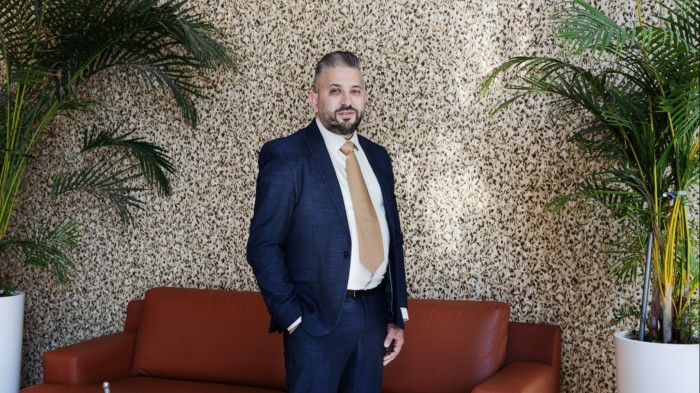When Covid-19 hit, Abdelilah Hlallouch, a tech entrepreneur of Moroccan heritage who was born and raised in the Netherlands, seized the opportunity to fulfil a long-held ambition of launching a business in the country of his forebears.
Like most other countries, Morocco closed its borders and suspended flights in response to the pandemic, implementing one of the strictest lockdown regimes in the region. It meant Hlallouch, who was visiting family in Tangier at the time, found himself trapped there for almost a year.
The result was Tingis Web, a digital marketing and tech solutions company based in the northern port city that started with just four employees. Its rapid growth since then — it now employs 26 people — has propelled it into the FT-Statista rankings at 20.
The company, whose services range from web portal design, including the one for Morocco’s official census last year, to outsourcing for international clients, experienced rapid revenue growth from just $170,000 in 2020 to $2.16mn in 2023. Last year, that figure rose to $2.8mn, according to Hlallouch.
“The idea to found a company in Morocco was always in my head and my heart, but when I was stuck there, it was like, OK, now I have to turn my idea into reality,” he explains.
Hlallouch, who had worked in the Netherlands managing IT systems for organisations including the Dutch central bank, says Covid represented an opportune moment to launch in Morocco.
“There was a shutdown of everything, so there was a lot of demand,” he says. “And in that time before 2020 there was a lack of digitalisation. So few businesses had a website, and few were doing anything digital, but after 2020, everyone wanted to do ecommerce and go digital.”

Morocco already had an IT outsourcing industry, but the strict lockdown regime gave the country’s digital sector a big boost.
Saloua Karkri-Belkeziz, an angel investor and former president of Morocco’s Federation of Information Technologies, Telecommunications and Offshoring (APEBI), says Covid “demonstrated the importance of digital technology” to both government and business.
“It was a real boost to the use of technology and an awareness-raising exercise for everyone,” she says. “Even now in Morocco, social assistance payments disbursed by the government are largely delivered through mobile phone transfers — something that didn’t exist before Covid, but which was put in place during the pandemic to help people like those who were out of work.”
Beyond its initial focus on online marketing for clients, Tingis Web branched out into software development, which now accounts for 60 per cent of revenues. Projects include a car-selling app and one for one of the country’s big telecom operators.
It is developing an ecommerce shipment platform for an international client and a warehouse management system with advanced artificial intelligence integration. Other projects include one for an energy management client and a micropayment solution for online gaming.

Despite Tingis Web’s rapid growth, Hlallouch concedes his business is not unique in Morocco, with competitors in the capital Rabat and Casablanca, the country’s main business centre. But he cites the contract to develop the portal for the 2024 census as an example that his company has established itself. Tingis Web’s bid was not the lowest, he says, but he believes it was the product’s sophistication and his international experience that won out.
The pandemic boosted Morocco’s digitalisation efforts, which were already in train after the Agency for Digital Development was set up in 2018 to help modernise government services and promote the country as a base for tech start-ups, says Karkri-Belkeziz.
This was followed in 2021 with the creation of the Ministry of Digital Transition and Administration Reform. “It’s important because it involves modernising the administration, providing better services to citizens, and digitalisation,” she says. “And it is good that the same minister has both portfolios.”
A year later, the government set out its Digital Morocco 2030 strategy. This set ambitious goals, including increasing the value of outsourcing contracts and other digital exports from $1.6bn in 2022 to $4.3bn by the end of the decade, as well as doubling the size of the technology workforce from 130,000 to 270,000 over the same period.
Karkri-Belkeziz also points to the improvements in connectivity at the three main telecoms operators, Maroc Telecom, Orange and Inwi, which have agreed to share their network infrastructure, lowering the price of fixed-line connections. She says there has also been an expansion in training programmes for the IT sector and more capital made available for start-ups, including a decision last year by the sovereign Mohammed VI Investment Fund to support new tech ventures.
“The strategy is in place and there is a very substantial budget allocated by the government to implement it,” she says. “Now what’s needed is simply to accelerate implementation.”
She points to issues that need addressing, such as the need to pass a law on the legal definition of a start-up and to make public procurement more digitally agile and flexible so start-ups can access the market. “We can’t use the same tools as before, with calls for tenders that require references and experience,” she says.
But Hlallouch says he is satisfied with what he has achieved so far and business is good. “At the moment, I’m filtering clients, because you cannot work for everybody,” he says. “If you try, your team will explode, and you will need a bigger office, and it’s a lot of problems. So I’m just filtering only high-quality clients.”
